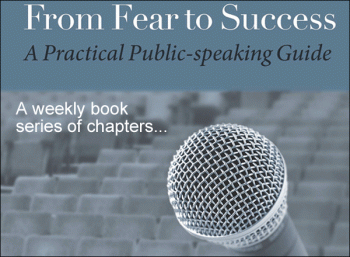Tom Dowd: Find the sources of stage fright
Dizzy head. Pounding heart. Shaking limbs. Sweating body. Shallow breathing. Queasy stomach. These symptoms hold people back from what they really want — SUCCESS. Public speakers of all levels will resonate with the concise methods found in "From Fear to Success," an easy-to-read guide to overcome anxiety and relate to any audience on their journey to find their communication confidence.
Chapter 2. Find the Sources of Stage Fright (Audio of this chapter is available here.)
You are approaching the lectern for the "big" presentation, or you're about to have the interview that will change the course of your life. You get dizzy; your heart pounds; your mouth gets dry. It seems to happen every time you need most to be calm, cool, and collected! What if you understood the root causes of your stage fright and anxiety? Understanding the sources of stage fright will enable you, the potential speaker, to take the steps necessary to address the fright head-on. The choice is fight or flight. It's time to fight back and get you to be the calm, cool, collected person you can be.
Make the anxiety go away. It may not be possible to make it go away fully, but wouldn't you like to have command over these feelings so you can take advantage of the opportunities presented to you? Stage fright can be categorized as biological, psychological, social, cultural, or a combination of all of the above. Some people might stop reading here, and say that there is far too much to go through to "solve" the public-speaking anxiety, so maybe avoiding it altogether is the best course of action.
I wish it was that easy. Depending on your job, for example, it may be a little easier to avoid these situations. However, what happens when you're asked to be the best man or maid of honor in a wedding? What if you are forced into the unfortunate duty of delivering a close friend's eulogy? What if you want to buy a car and need to negotiate? It should be becoming clear that avoiding public speaking situations isn't as easy as you might think, because they are everywhere. When you learn to address the symptoms straight on rather than avoiding the situation entirely, you will find that each new situation will get a little easier. Your confidence level will skyrocket. You may not notice it right away, but the invested time to practice and prepare will pay off in the end.
Can you "unlearn" the pent-up fears that have kept you from being your best? My wife often notes that I've successfully untrained everything she has taught our dog. Therefore, I have to believe we can turn the tides on our own emotions and confidence level.
I know what you're thinking: Can't you just give me medication? Is there an "app" for that? In a culture where we are constantly looking for a quick fix, they are available. If you do a search on iTunes, for example, it will bring up podcasts and applications relating to the topic of public speaking and stage fright. As far as medication, some jokingly may say, "Have a drink." I have read many books and articles on public speaking that reference the use of alcohol to calm nerves. All have very clearly stated the obvious risk of overindulgence, when you go beyond the calming of nerves you begin to impact your ability to think and speak clearly.
There are similar risks associated with taking medications, which only conceal the symptoms for a little while. You must remember that public speaking is everywhere, so reaching for medication may suffice for that one-time event, but may not always be there for a chance meeting that can change your life. The website www.changethatsrightnow.com
was one of many sources offering tips for quick resolutions to stage fright. There are many medications suggested to combat anxiety and stage fright. The organization Change That's Right Now describes the following three medications:
"Beta blockers are used for relieving performance anxiety. They work by blocking the flow of adrenaline that occurs when you're anxious. While beta blockers don't affect the emotional symptoms of anxiety, they can control physical symptoms such as shaking hands or voice, sweating, and rapid heartbeat.
"Antidepressants can be helpful when the feelings of fear are severe and debilitating. Three specific antidepressants — Paxil, Effexor, and Zoloft — have been approved by the U.S. Food and Drug Administration phobias.
"Benzodiazepines are fast-acting anti-anxiety medications. However, they are sedating and addictive, so they are typically prescribed only when other medications have not worked."
As with any discussion about medication, please check with your doctor before taking it to fully understand the impact it may have on your mind and body.
My caution for these suggestions—besides the side effects that may take some television commercials far too long to disclose to meet the regulations, at least in the United States—is the fact that the taking of this medication does not get to the root cause of the issue. Drugs are for short-term solutions. In fact, I think solution is probably too strong a word. I think it should actually be mask the symptoms. There are long-term, sustainable resolutions to control the onset of symptoms of stage fright. For those individuals willing to invest the time, they can have a lifetime of success versus the temporary fix you might find by going straight to your medicine cabinet.
In our anxiety over public speaking, our thoughts instantly go to a scene of us standing at a lectern in front of hundreds of people. Culturally, we are brought up from the time we are young to believe that public speaking and anxiety is synonymous. It would almost seem unnatural if I didn't include the statement that most people fear it more than death. This cultural myth has permeated our thoughts from the beginning, so we often perpetuate the myth by doing everything possible to avoid public-speaking situations. We are inadvertently taught about fearing fear itself.
We often create our own self-fulfilling prophesies. You can run from those presentations in front of hundreds of people periodically. However, each day presents itself with new challenges we could rise above if we simply learned the appropriate techniques to effectively communicate in a public setting, regardless of whether it is with one person or with thousands.
Anxiety is glossed over in a small section of many public-speaking books as being an inevitable part of the equation. Unfortunately, either through genes—which prove that some of us have a higher propensity for that type of anxiety—or cultural inundation of the horrors of public speaking, we all believe we can simply suffer through the few times we'll be required to speak publicly. In some cases, we are pointed toward a quick fix designed to simply get us through a single moment. My goal is to get you to stand tall and confidently present yourself in a commanding and influential manner that will cause the receiver of your message to take notice as a result of the power of your words, gestures, and vocal inflections. I want you to be able to stand in front of a crowd with a smile on your face, and truly mean it. That smile will show the world that you are having fun and that your messages are being heard. I can teach you that the rising heat up the sides of your neck and a flushing face should be an afterthought rather than something that impacts your ability to attain your public speaking goals. In fact, let's strike the afterthought comment, and set a goal to not even think about it at all. With preparation and practice, it is possible.
I have an almost existential view of public speaking. Don't psych yourself up so much that it takes away from your ability to rationally state the points necessary to make an impact, and don't talk yourself down so much that the audience's enthusiasm wanes at your own lack of passion. Repeating the same words, "I can do this, I can do this, I can do this" as you struggle to stand upright on your walk to the lectern most likely won't strengthen your presentation. In addition, the repeated mantra won't resolve your deep-seated fear unless the true investment of practice and preparation are also part of the process. Stage fright may not ever fully go away, but it can be controlled with the right invested actions and efforts. These actions and efforts will most likely all filter back to practice and preparation.
Public speaking is a journey that needs the roller coaster ride for the audience to feel the emotions that you're feeling. The audience wants to be a part of your message and success. They want to walk away with some meaningful, inspirational, or motivational message. Public speaking surrounds us. It is a normal fact in our life and culture. Although technology has changed how we communicate, for the most part we still can't avoid the need to interact in some way on a regular basis. Even if you are more on the latter half of fight or flight when it comes to hitting the topic head on, you will need to use many aspects of public speaking, such as writing or sending a message. Some people would rather communicate behind a computer screen within social media channels, but in this book you will also learn the importance of the written word and understand what your message says about you, the writer. Your personal and professional success is directly linked to your ability to communicate effectively.
Related link:
• Chapter 1-Step into the Public Forum
 Tom Dowd has spoken at many of the Midcoast Rotary, Kiwanis and Lions clubs, is a member of the U.S. National Toboggan Championships Committee, and announcer of the event. He lives in Camden with his wife and three daughters. To read his full biography, click here. He can be contacted at transformationtom.com or tomdowd@roadrunner.com. Follow Tom on twitter: @TomDowd4; connect on Facebook at Thomas Dowd Professional Development & Coaching; and on Linkedin, listed as Thomas B Dowd.
Tom Dowd has spoken at many of the Midcoast Rotary, Kiwanis and Lions clubs, is a member of the U.S. National Toboggan Championships Committee, and announcer of the event. He lives in Camden with his wife and three daughters. To read his full biography, click here. He can be contacted at transformationtom.com or tomdowd@roadrunner.com. Follow Tom on twitter: @TomDowd4; connect on Facebook at Thomas Dowd Professional Development & Coaching; and on Linkedin, listed as Thomas B Dowd.


























